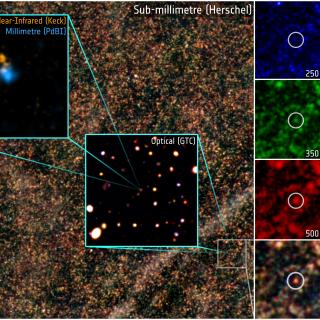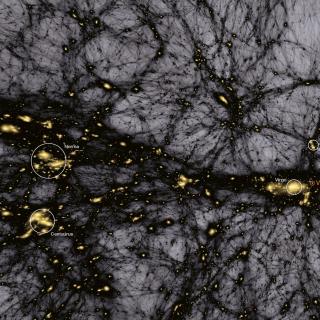Bibcode
Pâris, I.; Petitjean, Patrick; Aubourg, Éric; Ross, Nicholas P.; Myers, Adam D.; Streblyanska, A.; Bailey, Stephen; Hall, Patrick B.; Strauss, Michael A.; Anderson, Scott F.; Bizyaev, Dmitry; Borde, Arnaud; Brinkmann, J.; Bovy, Jo; Brandt, William N.; Brewington, Howard; Brownstein, Joel R.; Cook, Benjamin A.; Ebelke, Garrett; Fan, Xiaohui; Filiz Ak, Nurten; Finley, Hayley; Font-Ribera, Andreu; Ge, Jian; Hamann, Fred; Ho, Shirley; Jiang, Linhua; Kinemuchi, Karen; Malanushenko, Elena; Malanushenko, Viktor; Marchante, Moses; McGreer, Ian D.; McMahon, Richard G.; Miralda-Escudé, Jordi; Muna, Demitri; Noterdaeme, Pasquier; Oravetz, Daniel; Palanque-Delabrouille, Nathalie; Pan, Kaike; Perez-Fournon, I.; Pieri, Matthew; Riffel, Rogério; Schlegel, David J.; Schneider, Donald P.; Simmons, Audrey; Viel, Matteo; Weaver, Benjamin A.; Wood-Vasey, W. Michael; Yèche, Christophe; York, Donald G.
Referencia bibliográfica
Astronomy and Astrophysics, Volume 563, id.A54, 15 pp.
Fecha de publicación:
3
2014
Revista
Número de citas
239
Número de citas referidas
224
Descripción
We present the Data Release 10 Quasar (DR10Q) catalog from the Baryon
Oscillation Spectroscopic Survey (BOSS) of the Sloan Digital Sky Survey
III. The catalog includes all BOSS objects that were targeted as quasar
candidates during the first 2.5 years of the survey and that are
confirmed as quasars via visual inspection of the spectra, have
luminosities Mi[z = 2] <-20.5 (in a ΛCDM cosmology
with H0 = 70 km s-1 Mpc-1,
ΩM = 0.3, and ΩΛ = 0.7), and
either display at least one emission line with a full width at half
maximum (FWHM) larger than 500 km s-1 or, if not, have
interesting/complex absorption features. The catalog also includes known
quasars (mostly from SDSS-I and II) that were reobserved by BOSS. The
catalog contains 166 583 quasars (74 454 are new discoveries since
SDSS-DR9) detected over 6373 deg2 with robust identification
and redshift measured by a combination of principal component
eigenspectra. The number of quasars with z > 2.15 (117 668) is ~5
times greater than the number of z > 2.15 quasars known prior to
BOSS. Redshifts and FWHMs are provided for the strongest emission lines
(C iv, C iii, Mg ii). The catalog identifies 16 461 broad absorption
line quasars and gives their characteristics. For each object, the
catalog presents five-band (u, g, r, i, z) CCD-based photometry with
typical accuracy of 0.03 mag and information on the optical morphology
and selection method. The catalog also contains X-ray, ultraviolet,
near-infrared, and radio emission properties of the quasars, when
available, from other large-area surveys. The calibrated digital spectra
cover the wavelength region 3600-10 500 Å at a spectral resolution
in the range 1300 < R < 2500; the spectra can be retrieved from
the SDSS Catalog Archive Server. We also provide a supplemental list of
an additional 2376 quasars that have been identified among the galaxy
targets of the SDSS-III/BOSS.
Quasar catalog is only available at the CDS via anonymous ftp to http://cdsarc.u-strasbg.fr
(ftp://130.79.128.5) or via http://cdsarc.u-strasbg.fr/viz-bin/qcat?J/A+A/563/A54
Proyectos relacionados

Formación y Evolución de Galaxias: Observaciones Infrarrojas y en otras Longitudes de Onda
Este grupo desarrolla varios proyectos extragalácticos en diferentes rangos del espectro electromagnético utilizando satélites y telescopios en tierra para estudiar la evolución cosmológica de las galaxias y el origen de la actividad nuclear en galaxias activas. En el aspecto instrumental, el grupo forma parte del consorcio internacional que ha
Ismael
Pérez Fournon

Cosmología con Trazadores de la Estructura a Gran Escala del Universo
El Fondo Cósmico de Microondas (FCM) contiene la información estadística de las semillas primigenias que han dado lugar a la formación de todas las estructuras en el Universo. Su contrapartida natural en el Universo local es la distribución de las galaxias que surgen como resultado del crecimiento gravitatorio de aquellas fluctuaciones de densidad
FRANCISCO SHU
KITAURA JOYANES